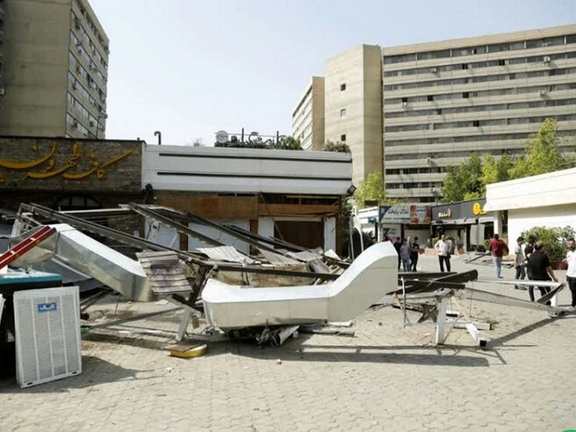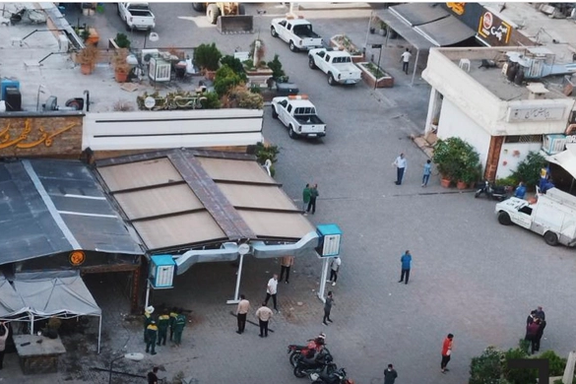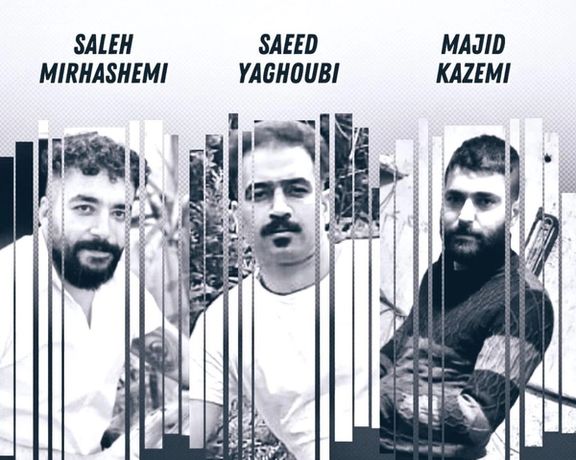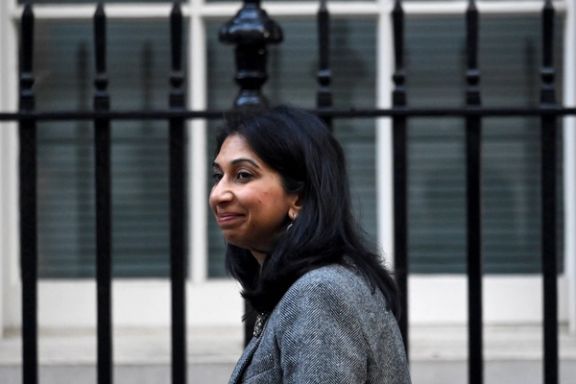Israeli Intelligence Minister Meets Iranian Prince In Washington

A month after the official visit of Iran's exiled Prince Reza Pahlavi to Israel, the country’s intelligence minister met him once again in Washington.

A month after the official visit of Iran's exiled Prince Reza Pahlavi to Israel, the country’s intelligence minister met him once again in Washington.
Gila Gamliel, who hosted Reza Pahlavi and his wife during their five-day trip to Israel, tweeted on Wednesday that she had a "successful meeting" with the Iranian exiled prince, and two human rights activists as well as the president of the Israel Allies Foundation.
"The bloodthirsty policy of the Ayatollahs' regime, which hurts the people of Iran and the world, should mobilize the international community," she added.
She called Pahlavi's visit to her country "historic" and "the beginning of a new path towards the resumption of friendship between the nations of Israel and Iran," emphasizing that she will continue to meet and negotiate with the Iranian opposition leader in the future.
Activists Benjamin F. Chavis and Tish K. Basil, as well as President of the Israel Allies Foundation Josh Reinstein also attended the meeting between Pahlavi and Gamliel.
“Great to meet with a champion of freedom and the greatest hope for peace between Israel and Iran Reza Pahlavi,” wrote Reinstein in a tweet.
The Israel Allies Foundation was established 16 years ago in the United States and its headquarter is in Jerusalem.
Based on Christian beliefs and Judeo-Christian values it tries to support the existence and strengthening of Israel and to educate and empower legislators in countries around the world.
This foundation organizes tours to familiarize foreign politicians with the state of Israel. Israeli leftist groups criticize some of the actions of the foundation.
It seems that the Israeli government under the leadership of Benjamin Netanyahu, has assigned Gamliel to continue contacts with Reza Pahlavi.

The municipality demolished the outdoor space of several cafes in Tehran’s defiant Ekbatan district, but residents are helping them to clean up and resume business.
Municipality workers supported by riot police on motorbikes, masked security agents and Basij militia began demolishing the outdoor seating spaces of the cafes that have no inside seating at five in the morning on Sunday for what the district mayor, Ehsan Sharifi, said was “unlicensed use of the outside space”.
The neighborhood was an epicenter of protests ignited by the death of Mahsa Amini, the 22-year-old woman who was fatally injured in September 2022 while in police custody following her arrest for not wearing her headscarf “properly.”

The Basij militia of the Revolutionary Guards (IRGC) has four bases within the five square kilometer complex which has 15,500 apartments and a population of around 45,000. The neighborhood is very popular with professionals, artists and other educated groups with a sense of community unmatched elsewhere in the city.
“They ransacked everything outside the little cafes. Some of these cafes like Godar and Tehroun have been here for years. It was because of hijab but they claim the residents had complained about these businesses,” a young man from Ekbatan told Iran International.
“Do you think they were here to arrest the leader of a human trafficking band? Or that they had found a drug kitchen? Or to arrest an Interpol wanted criminal? Did they find bombs?” tweeted Shahrak Ekbatan, the neighborhood's popular twitter account after the incident.
“No! … They demolished the cafes for spreading ‘corruption and immorality”. Why? Because they are afraid of the people of Ekbatan and their solidarity,” the tweet said.
The admin of the account who wanted to be quoted by the name Aida told Iran International that demolition of the cafes has created a greater sense of solidarity among the residents. “People immediately came to help clean up the mess they left behind and are buying more takeaway at these places to support them.
Residents have dubbed their neighborhood as “The United States of Ekbatan” and “Autonomous States of Ekbatan”.
“This neighborhood does not obey the laws of the Islamic Republic. Enjoy your day!” a graffiti on the wall of one of the blocks, covered in anti-regime slogans, declared recently.
For over three decades Ekbatanis, as they like to call themselves, have hosted one of Tehran’s biggest Charshanbe Suri bonfire night festivals in late March. The police and the Basij militia, who consider the festival a pagan tradition, always cracked down on the merry-making boys and girls, who often flouted the hijab rules too, playing loud music and dancing in the leafy spaces between the buildings.
Ekbatan was also famous for its nightly anti-regime “window chanting” during last year’s protests. Residents have been chanting again from their windows since Monday after rumors emerged that three protesters were at imminent risk of execution in Isfahan.

The US, UK, Denmark and others have warned about the booming practice of unregulated ship-to-ship oil transfers at sea, which increase the risk of pollution.
"These transfers undermine the rules-based international order and increase the risk of pollution to nearby coastal States. This threatens global efforts to prevent pollution from ships," the paper submitted to the UN said.
The paper was submitted to United Nations International Maritime Organization (IMO), by the member states ahead of a major marine environment protection committee session in July. It was also backed by Australia, Canada, Spain and Ukraine.
Hundreds of "ghost" tankers, which are not fully regulated, have joined this opaque parallel trade over the past few years, carrying oil from countries hit by Western sanctions and restrictions, including Russia and Iran, whose oil exports have been sanctioned.
The number of incidents last year, including groundings, collisions and near misses involving these ships reached the highest in years, a Reuters investigation showed.
"These risky practices, although under the jurisdiction of a flag state, unjustly expose national and local governments and authorities to paying for response and clean-up costs and compensating victims," the paper said.
Tactics used by such ships include switching off tracking transponders, faking locations and also conducting ship-to-ship (STS) operations at locations outside of authorized transfer zones and sometimes in poor weather to conceal activities.
The paper, which will be discussed at the IMO session, said deceptive shipping practices were also "serious threats to the safety and security of international shipping", including crew members.
The countries recommended that when flag states became aware of such practices, they should step up inspections of those vessels and boost monitoring of activity including around territorial waters.
Reuters Report

Protestors in cars have gathered outside the jail in Esfahan (Isfahan) in an attempt to stop the execution of three political prisoners.
The demonstrators drove to the prison in central Iran to protest Wednesday night. Majid Kazemi, Saleh Mirhashemi, and Saeed Yaqoubi are being held in Esfahan, awaiting the death sentence handed down in a trial condemned as a travesty of justice by human rights campaigners.
They were convicted over the death of two IRGC’s Basij militia members and a police officer in protests of November last year, in what Persian media have dubbed the ‘Isfahan House’ case.
Security forces’ gunfire was heard around the jail during the protest.
The three political prisoners wrote from jail on Wednesday urging the people to stop their execution.
Describing themselves as "children of Iran" in the letter, the three prisoners said: "Hello. We ask our dear fellow citizens not to let them kill us. We need your help. We need your support."
On Sunday night, demonstrators had gathered outside the prison hoping to stop the feared hangings.
Opposition activists say the death penalty is being used against the Isfahan House three as an intimidation tactic to stop further protests.
Campaigners say the prisoners were tortured into confessions, and there is no reliable evidence against them.
Iranian expatriate communities plan demonstrations against the executions in cities worldwide on Saturday, May 20.

An Iranian detained protester has died days after being freed – the latest death in suspicious circumstances of released activists.
Amir Hossein Tarval Iman was pardoned and released last week after eight months detention but suffered a fatal heart attack a few days later.
His lawyer Maryam Kian Ersi confirmed the death in a tweet on Wednesday.
The "Committee to Follow Up on the Status of Detainees" had announced in a report that Tarval was arrested on October 24, when regime agents raided his home in Aliabad district of Tehran. The report added that he was interrogated and tortured during the detention.
He was tried on a charge of "Moharebeh" or war against God on December 20, facing a possible death penalty.
The committee said Tarval was temporarily released from the notorious Evin prison on bail but died "suspiciously" only ten days later on May 16.
Since protests began last year, regime agents have arrested nearly 20,000 Iranians. Many have been released but a number have died apparently with no certain reason.
19-year-old Yalda Aghafazli died last month after being released from prison without any medical preconditions. Hospital tests indicated a significant amount of narcotics in her blood system.
In November, Arshia Emamgholizadeh, 16, was arrested in East Azarbaijan province for throwing the turban of a cleric. He was kept in prison for ten days and released on bail. He committed suicide two days later. He had told his friends that prison authorities gave them some pills to swallow every night, as well as torturing them.
Some doctors believe that whatever drug was given to some prisoners addicted them to a degree that after being released they experienced severe depression.

The UK government is split over whether to proscribe Iran’s Revolutionary Guard (IRGC) as a terror group, according to press reports.
Home Secretary Suella Braverman and Security Minister Tom Tugendhat are both said to back the move and bring Britain in line with policy in the US.
But Foreign Secretary James Cleverly is believed to be holding out against the change.
Critics say he is being badly advised by civil servants, claiming he is “too closely led by officials”.

The reports come after British-Iranian campaigner Vahid Beheshti ended his 73-day hunger strike outside the Foreign Office building in London last week. Now recovering in hospital, Beheshti has been calling for the British government to ban the IRGC. He has the support of more than a hundred members of the UK parliament.
The IRGC is designated as a “foreign terrorist organization” by the US, and has a long history of fomenting assassinations and attacks on civilians across the region and around the world. Earlier this year British counter-terrorism officers revealed that they had foiled 15 plots by Iran to either kidnap or kill British or UK-based individuals it considers “enemies of the regime”.
However, the Foreign Office is said to believe in valuing intelligence and maintaining dialogue over a “gesture”, as one source speaking to The Sun newspaper described the terror designation for the IRGC.
There is also said to be concern over how Tehran might retaliate, whether by targeting UK citizens in Iran – possibly adding to the number of foreigners who have been taken hostage – or by acting on British soil.
A Foreign Office source The Sun: “Nothing is ruled in or out. And anonymous personal comments about the Foreign Secretary will not distract from the ongoing business of the Government.”

However, Security Minister Tugendhat’s uncompromising approach over Iran was echoed by his counterpart in the Labour Party opposition, who are leading the governing Conservative Party in the polls and widely predicted to take over in government after a scheduled general election next year.
Speaking at a security conference in London, Shadow Security Minister Holly Lynch added her voice to calls for a ban on the IRGC.
She said a ban “wouldn’t simply be a symbolic measure – which would be powerful in its own right, but that is not what proscription powers should be used for.”
The shadow minister added: “Proscription would grant law enforcement the powers to take action against those supporting the IRGC and allow for a more effective dismantling of the support base necessary to facilitate such unacceptable conduct here within our borders.”
She voiced her outrage over the revelation of the 15 plots by Iran against targets in Britain, many of them in the media.
Ms Lynch said: “We have to ask ourselves what message does that send to the rest of the world, when journalists are not safe here in the UK.
“When we have authoritarian hostile states engaged in exporting tyranny into our country, pursuing those they perceive as enemies, and the heads of our security services are calling it out for the terrorism that it is, it calls for a significant and robust response from the UK.”